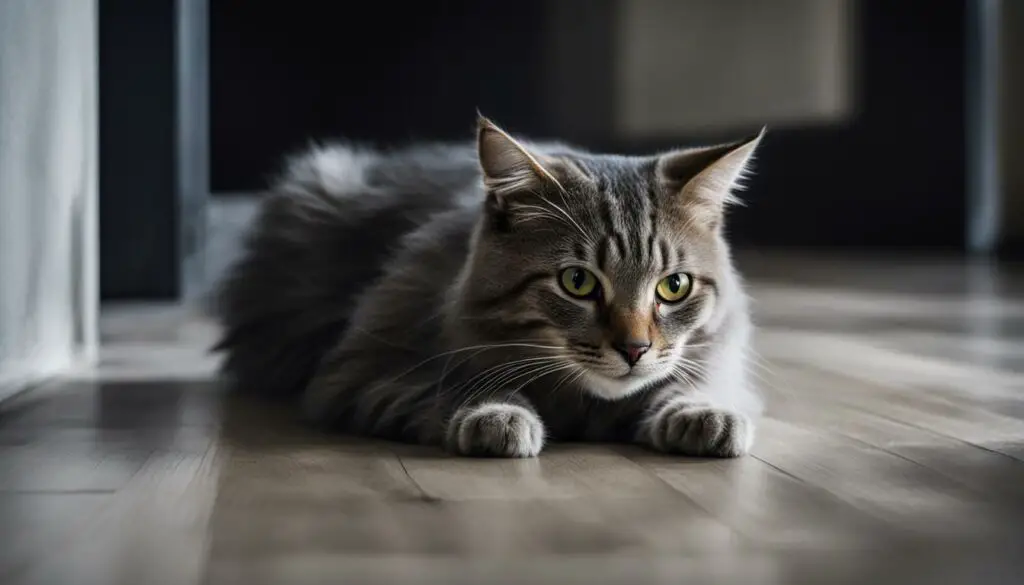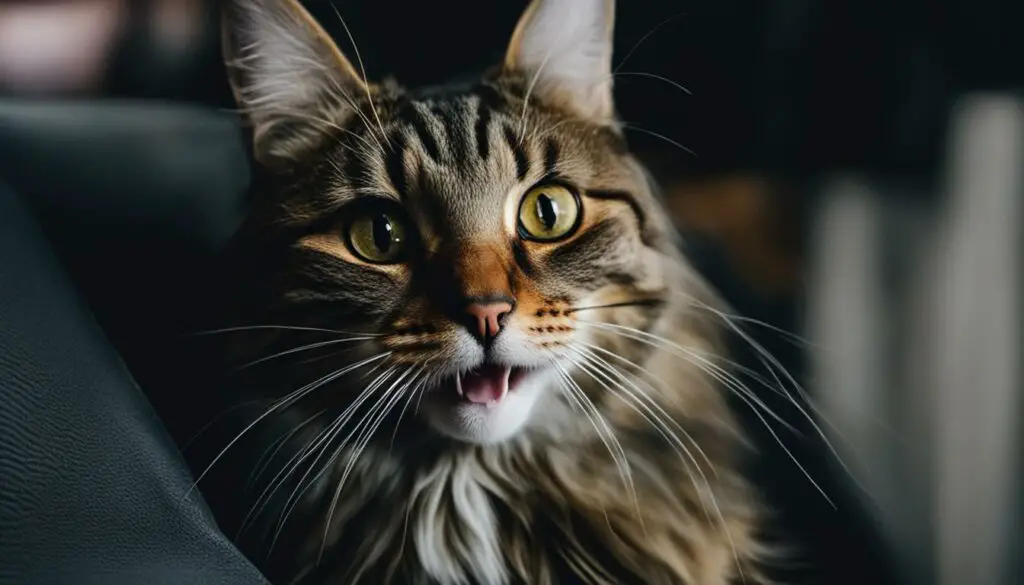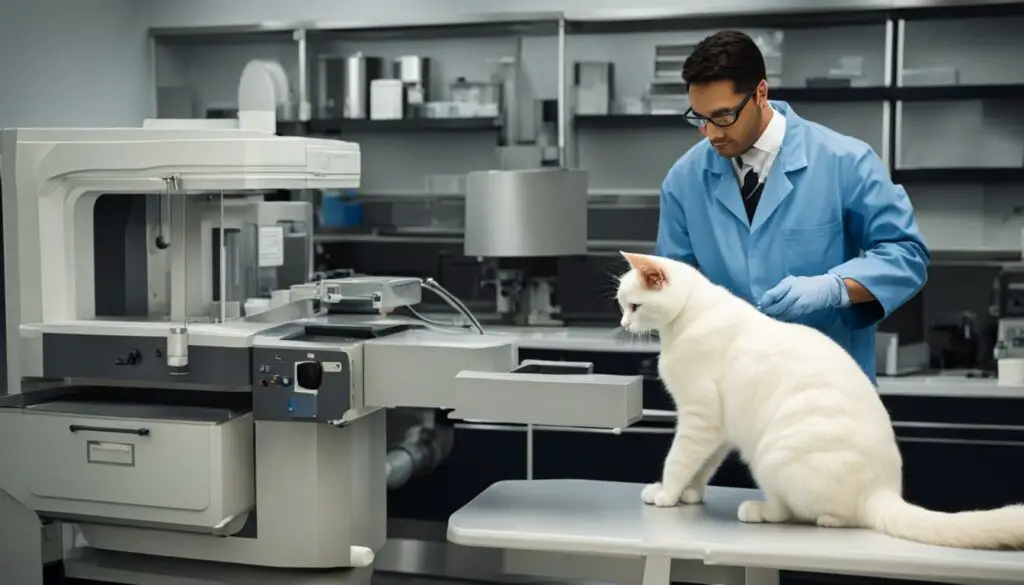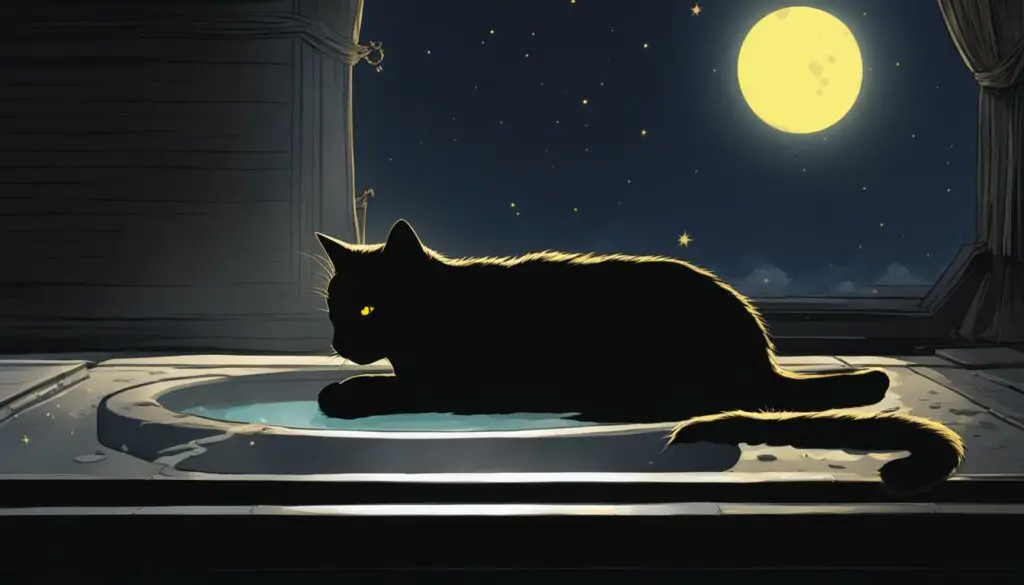As a cat owner, I understand how concerning it can be when your feline companion starts vomiting, especially if it happens at night. Cat vomiting at night only can be a puzzling and frustrating issue to deal with, but it’s essential to delve deeper into the problem to find the underlying causes and appropriate solutions.
Cat vomiting can occur due to various factors, including stomach disorders, minor intestinal upset, infections, obstructions, liver disease, thyroid disease, inflammatory bowel disease, and even cancer. It’s crucial to differentiate between vomiting, regurgitation, and coughing, as each has different characteristics and implications.
In this article, I will guide you through the causes of cat vomiting at night only, how to recognize vomiting in cats, and the appropriate treatments for both acute and chronic vomiting. Let’s explore the mysteries behind cat vomiting and ensure the health and well-being of our furry friends.
Key Takeaways:
- Cat vomiting at night only can be caused by various factors, including stomach disorders, infections, and even cancer.
- Differentiating between vomiting, regurgitation, and coughing is crucial for proper evaluation and treatment.
- Occasional vomiting, especially if it involves hairballs, may not be abnormal, but severe or chronic vomiting should be addressed by a veterinarian.
- Acute vomiting, present for less than two to three days, can often resolve with simple treatment, while chronic vomiting requires further investigation.
- Treatment for cat vomiting includes symptomatic relief for acute cases and tailored approaches for chronic cases based on the underlying cause.
Is Cat Vomiting at Night Normal?
Occasional vomiting in cats, especially at night, may not be abnormal. Cats naturally swallow hair while grooming, which can lead to occasional hairball vomiting. However, if your cat is vomiting more frequently or if the vomit contains other substances, it may indicate an underlying issue. Severe or chronic vomiting is more serious and can lead to complications if left untreated.
It is important to note the difference between acute and chronic vomiting. Acute vomiting refers to vomiting that has been present for less than two to three days, while chronic vomiting occurs more frequently over an extended period. While acute vomiting may resolve on its own or with simple treatment, chronic vomiting requires further investigation to identify the underlying cause.
If you notice your cat vomiting at night, it’s important to monitor their behavior and overall health. Keep track of the frequency, duration, and characteristics of the vomiting, such as the color, consistency, and presence of substances. This information can help your veterinarian determine the best course of action for diagnosis and treatment.

Is Cat Vomiting at Night Normal?
Occasional vomiting in an otherwise healthy cat, especially if it involves hairballs, may not be abnormal. Cats naturally swallow hair while grooming and will periodically vomit hairballs. However, if your cat is vomiting hairballs more frequently or if the vomit contains other substances, it may indicate an underlying issue. Severe or chronic vomiting is more serious and can lead to complications if left untreated.
| Vomit Characteristics | Possible Causes |
|---|---|
| Clear or frothy vomit | Stomach disorders, minor intestinal upset, hairballs |
| Yellow or green vomit | Bile reflux, food intolerance, liver disease |
| Red or brown vomit | Blood in the vomit, possible bleeding ulcers, tumors |
| Vomit containing food | Food allergies, dietary changes, inflammatory bowel disease |
If you notice your cat vomiting at night, it’s important to monitor their behavior and overall health. Keep track of the frequency, duration, and characteristics of the vomiting, such as the color, consistency, and presence of substances. This information can help your veterinarian determine the best course of action for diagnosis and treatment.
Recognizing Vomiting in Cats
Recognizing the signs of vomiting in cats is crucial for understanding their health and well-being. When it comes to cat vomiting at night only, it’s important to pay attention to certain behaviors and physical cues. Nausea, restlessness, lip licking, and swallowing can all be early signs that your cat is about to vomit. These signs are often followed by forceful contractions of the abdominal muscles, leading to the expulsion of fluid, froth, or food. By being aware of these signs, you can take prompt action to address your cat’s needs.
It’s also important to differentiate between vomiting and regurgitation. While vomiting is typically associated with abdominal contractions, regurgitation occurs without abdominal contractions and often happens right after eating or drinking. By understanding these differences, you can better communicate with your veterinarian and provide them with the necessary information to diagnose and treat your cat’s condition.
When it comes to recognizing vomiting in cats, it’s important to closely observe their behavior and physical symptoms. By doing so, you can ensure that your feline friend receives the appropriate care and treatment.

Acute Vomiting in Cats
Acute vomiting in cats refers to vomiting that has been present for less than two to three days. Most cases of acute vomiting resolve quickly with simple treatment and do not require further investigation. However, it is important to determine the underlying cause of acute vomiting to ensure proper management and prevent complications.
The causes of acute vomiting in cats can range from minor intestinal upset, such as eating spoiled food or ingesting non-digestible objects, to more serious conditions like infections, obstructions, liver disease, and inflammatory bowel disease. While many cases of acute vomiting can be resolved with symptomatic treatment, severe or persistent acute vomiting may require additional tests, specific treatment, and supportive care.
It is crucial to monitor your cat’s condition closely when they are experiencing acute vomiting. If your cat shows signs of dehydration, such as sunken eyes, dry mouth, or reduced urine output, or if they have other concerning symptoms like lethargy, loss of appetite, or abdominal pain, it is important to seek veterinary attention promptly. A veterinarian can perform a thorough examination, conduct necessary tests, and provide appropriate treatment to address the underlying cause of acute vomiting and help your cat recover.

| Causes of Acute Vomiting in Cats | Treatment |
|---|---|
| Minor intestinal upset | Symptomatic treatment, such as feeding an easily digested, bland diet and offering freely available water |
| Infections | Treatment with appropriate medications |
| Obstructions | Removal of the obstruction through medical or surgical intervention |
| Liver disease | Treatment depends on the specific condition and may involve dietary changes, medication, or supportive care |
| Inflammatory bowel disease | Dietary modifications, medications to control inflammation, and supportive care |
In conclusion, acute vomiting in cats should not be ignored, as it can indicate underlying health issues that require attention. While many cases of acute vomiting can be managed with symptomatic treatment, severe or persistent vomiting should be evaluated by a veterinarian. Identifying the cause of acute vomiting is crucial for appropriate treatment and ensuring your cat’s well-being.
Symptomatic Treatment for Acute Vomiting
When it comes to addressing acute vomiting in cats, symptomatic treatment is often the first line of action. The goal of this approach is to provide relief and manage the symptoms while addressing the underlying cause. Non-specific symptomatic treatment includes a combination of dietary adjustments, hydration, and medication, if prescribed by a veterinarian.
Feeding your cat an easily digested, bland diet can help soothe the stomach and reduce further irritation. Offer small, frequent meals to prevent overwhelming the digestive system. A simple homemade diet consisting of boiled chicken or fish and rice can be suitable, or your veterinarian may recommend a specific commercial diet formulated for cats with gastrointestinal sensitivities.
In addition to diet, it’s essential to ensure your cat has access to fresh water at all times. Vomiting can lead to dehydration, so encouraging your cat to drink regularly can help prevent this complication. If your cat is unable to keep water down, your veterinarian may recommend administering fluids subcutaneously to maintain hydration.
| Treatment | Description |
|---|---|
| Medication | If prescribed by a veterinarian, medications such as anti-nausea drugs or anti-inflammatory drugs may be given to control vomiting or reduce inflammation in the gastrointestinal tract. |
| Monitoring | Regular monitoring of your cat’s condition is important during symptomatic treatment. Keep an eye on the frequency and severity of vomiting episodes, as well as any changes in appetite or behavior. If there is no improvement or if the condition worsens, contact your veterinarian for further guidance. |
It’s important to note that symptomatic treatment is not a cure for acute vomiting. It is a temporary measure to provide relief and manage symptoms while the underlying cause is being addressed. If your cat’s condition does not improve with symptomatic treatment or if the vomiting becomes severe or persistent, further diagnostic tests or a change in treatment approach may be necessary.
Diagnostic Testing for Chronic Vomiting
When a cat experiences chronic vomiting, it is important to conduct diagnostic testing to determine the underlying cause. Veterinarians have various tools at their disposal to aid in this process, including blood tests, imaging tests, endoscopy, and laparotomy.
Blood Tests:
Blood tests can provide valuable information about the cat’s overall health and help identify potential underlying causes of vomiting. These tests can check for infections, liver and kidney function, thyroid disease, and other abnormalities that may contribute to chronic vomiting.
Imaging Tests:
X-rays and ultrasounds are commonly used imaging tests to assess the digestive system and identify any obstructions, tumors, or abnormalities. These tests can provide valuable insights into the cause of chronic vomiting and help guide further diagnostic and treatment plans.
Endoscopy and Laparotomy:
In some cases, an endoscopy or laparotomy may be necessary to visualize and obtain samples from the gastrointestinal tract. Endoscopy involves inserting a flexible tube with a camera into the cat’s digestive system, while laparotomy is a surgical procedure that allows for a more thorough examination of the abdominal organs. These procedures can help identify abnormalities such as ulcers, inflammation, or tumors and collect biopsy samples for further analysis.

By conducting appropriate diagnostic tests, veterinarians can gain a better understanding of the underlying cause of a cat’s chronic vomiting. This information is crucial for developing an effective treatment plan and improving the cat’s overall well-being.
Treatment Options for Chronic Vomiting
When it comes to treating chronic vomiting in cats, it is important to address the underlying cause. The precise treatment options will depend on the specific diagnosis. Here are some potential treatment approaches that may be recommended:
Dietary Modifications:
Switching to a specially formulated diet can be beneficial for cats with chronic vomiting. These diets are designed to be easily digestible and can help reduce gastrointestinal irritation. Your veterinarian may recommend a prescription diet or provide guidelines for preparing a home-cooked diet that meets your cat’s nutritional needs.
Medications:
In some cases, medications may be prescribed to control vomiting or reduce inflammation in the digestive tract. Antiemetic drugs can help suppress the vomiting reflex, while anti-inflammatory medications can help alleviate gastrointestinal inflammation. It is important to follow your veterinarian’s instructions carefully when administering medications to your cat.
Surgical Interventions:
In cases where obstructions, tumors, or other physical abnormalities are identified as the cause of chronic vomiting, surgery may be necessary. Surgical interventions can help remove obstructions or tumors, allowing for improved digestive function and alleviation of vomiting symptoms. Your veterinarian will discuss the potential risks and benefits of surgery with you and develop an appropriate treatment plan.
It is crucial to work closely with your veterinarian to determine the most suitable treatment options for your cat’s specific condition. Regular communication and follow-up visits are important to monitor your cat’s progress and make any necessary adjustments to the treatment plan. With proper management and care, many cats with chronic vomiting can experience significant improvement in their symptoms and overall quality of life.

Common Causes of Cat Vomiting
When it comes to cat vomiting at night only, there are several common causes that pet owners should be aware of. Understanding these causes can help in identifying the underlying issue and seeking appropriate treatment. Here are some of the most frequent reasons why cats vomit:
| Cause | Description |
|---|---|
| Food Allergies | Certain ingredients in a cat’s diet can trigger an allergic reaction, leading to vomiting. |
| Ingesting Toxins or Chemicals | Cats can accidentally consume poisonous substances, such as cleaning agents or plants, which can result in vomiting. |
| Eating Unsafe Human Foods | Some human foods, like chocolate, onions, or grapes, can be toxic to cats and cause vomiting when ingested. |
| Hairballs | Cats groom themselves and may ingest hair, which can accumulate in the stomach and lead to vomiting. |
| Intestinal Parasites | Worms and other parasites can irritate the digestive system, causing vomiting as a result. |
| Inflammation of the Intestines | Conditions like inflammatory bowel disease can cause chronic inflammation in the intestines, leading to vomiting. |
| Obstructions | Foreign objects or hairballs can block the digestive tract, resulting in vomiting as the body tries to expel the obstruction. |
| Organ Dysfunction | Problems with organs like the liver or kidneys can cause vomiting in cats. |
| Endocrine Disorders | Hormonal imbalances, such as hyperthyroidism, can lead to vomiting. |
| Neurological Disorders | Certain neurological conditions can affect the digestive system and cause vomiting. |
| Infections | Bacterial, viral, or fungal infections can cause inflammation and irritation in the gastrointestinal tract, leading to vomiting. |
| Tumors | While less common, tumors in the digestive system can cause vomiting in cats. |
Identifying the specific cause of vomiting is crucial for determining the appropriate treatment plan and managing the health of your cat.
Determining the Cause of Cat Vomiting
When it comes to cat vomiting, determining the cause can be a challenging task. However, a thorough examination, accurate history, and diagnostic tests are essential for identifying the underlying issue. To start the diagnostic process, I perform a comprehensive physical examination on the cat. This includes checking for any abnormalities in the abdomen, assessing the cat’s hydration levels, and evaluating their overall condition. Additionally, I take into consideration the cat’s medical history, including any recent dietary changes, exposure to toxins, and the timing and frequency of the vomiting episodes.

Based on the physical examination and history, further diagnostic tests may be necessary to reach a definitive diagnosis. Blood tests can provide valuable information about the cat’s organ function, presence of infections, and potential hormonal imbalances. X-rays, ultrasounds, and endoscopy can help identify any obstructions, tumors, or inflammation in the gastrointestinal tract. In some cases, exploratory surgery may be required to obtain biopsy samples for analysis.
Table: Diagnostic Tests for Cat Vomiting
| Diagnostic Test | Purpose |
|---|---|
| Blood tests | Assess organ function, detect infections, evaluate hormonal imbalances |
| X-rays | Identify obstructions, tumors, or abnormalities in the gastrointestinal tract |
| Ultrasound | Visualize internal organs and detect abnormalities |
| Endoscopy | Examine the gastrointestinal tract and obtain biopsy samples |
| Exploratory surgery | Collect biopsy samples and visually inspect the abdominal cavity |
By utilizing these diagnostic tools, I am able to determine the cause of the cat’s vomiting and provide appropriate treatment. It’s important to remember that the underlying cause of cat vomiting can vary widely, from minor gastrointestinal upset to more serious conditions such as inflammatory bowel disease or organ dysfunction. Identifying the cause is crucial for effective management and ensuring the cat’s long-term health and well-being.
Distinguishing between Acute and Chronic Vomiting
When it comes to cat vomiting at night only, understanding the difference between acute and chronic vomiting is crucial for determining the urgency of veterinary intervention. Acute vomiting refers to vomiting that has been present for a short duration, typically less than two to three days. In most cases, acute vomiting resolves with simple treatment and does not require further investigation. However, severe or persistent cases of acute vomiting may indicate an underlying issue that needs to be addressed.
On the other hand, chronic vomiting involves recurrent episodes of vomiting over an extended period, usually more than once a month. Chronic vomiting should be evaluated by a veterinarian to identify the underlying cause and provide appropriate treatment. It’s important to note that chronic vomiting can lead to dehydration and electrolyte imbalances if left untreated, so early intervention is essential.
To determine whether vomiting is acute or chronic, it’s helpful to observe the frequency and duration of the episodes. Acute vomiting is typically of shorter duration and may resolve on its own or with minimal treatment. Chronic vomiting, on the other hand, occurs repeatedly over a longer period and often requires more comprehensive diagnostic testing to uncover the root cause. It’s recommended to consult with a veterinarian if you’re unsure about the nature of the vomiting and to ensure your cat receives appropriate care.
Table: Differences between Acute and Chronic Vomiting in Cats
| Acute Vomiting | Chronic Vomiting | |
|---|---|---|
| Duration | Short, typically less than two to three days | Recurrent, more than once a month |
| Resolution | Can resolve on its own or with minimal treatment | Requires comprehensive diagnostic testing and targeted treatment |
| Consequences | May not lead to complications if promptly addressed | Can result in dehydration and electrolyte imbalances if left untreated |
| Veterinary Evaluation | May require further investigation for severe or persistent cases | Should be evaluated to identify underlying cause and provide appropriate treatment |
Understanding the distinction between acute and chronic vomiting in cats is essential for determining the appropriate course of action. If your cat is experiencing acute vomiting, you can try simple symptomatic treatment such as feeding an easily digestible diet and ensuring access to water. However, if the vomiting persists or becomes chronic, it’s important to seek veterinary care to diagnose the underlying cause and establish an effective treatment plan.
Vomit Characteristics: Color, Consistency, and Substances
Understanding the characteristics of cat vomit can provide valuable insights into the underlying cause of the vomiting. By examining the color, consistency, and substances present in the vomit, you can gather important information that can assist in diagnosis and treatment.
Color:
The color of the vomit can vary and may indicate different issues. Clear or foamy vomit is often a result of excess stomach acid or bile. Green vomit can indicate the presence of bile, while yellow vomit may suggest the presence of partially digested food. Brown vomit can be a sign of blood in the stomach or intestines, while red vomit may indicate fresh blood. It is important to monitor the color of the vomit as it can provide valuable clues for further investigation.
Consistency:
The consistency of the vomit can also offer insights into the source of the vomiting. Foam or frothy vomit is commonly associated with excess stomach acid or irritation. Bile vomit may appear thin and watery. Liquid vomit can indicate the presence of excess fluids in the stomach or an underlying gastrointestinal issue. Observing the consistency of the vomit can help narrow down potential causes and guide further examination.
Substances:
The presence of substances in the vomit can provide additional clues for diagnosis. Food particles in the vomit may suggest dietary issues or food intolerance. Grass or plant material may indicate ingestion of foreign objects or an attempt to induce vomiting. The presence of worms in the vomit may suggest intestinal parasites. Hairballs can also be present in vomit, especially in cats that groom themselves excessively. Paying attention to the substances present in the vomit can help identify potential causes and guide appropriate treatment.
Monitoring the characteristics of cat vomit can help determine the underlying cause and guide further veterinary care. If you notice any concerning changes in the color, consistency, or substances present in your cat’s vomit, it is important to consult with a veterinarian for proper evaluation and treatment.

| Vomit Characteristics | Possible Causes |
|---|---|
| Clear or foamy vomit | Excess stomach acid, bile |
| Green vomit | Presence of bile |
| Yellow vomit | Partially digested food |
| Brown vomit | Blood in the stomach or intestines |
| Red vomit | Fresh blood |
| Foam or frothy vomit | Excess stomach acid, irritation |
| Bile vomit | Thin and watery appearance |
| Liquid vomit | Excess fluids in the stomach, gastrointestinal issue |
| Food particles | Dietary issues, food intolerance |
| Grass or plant material | Ingestion of foreign objects, attempt to induce vomiting |
| Worms | Intestinal parasites |
| Hairballs | Excessive grooming |
When to Seek Veterinary Care for Cat Vomiting
As a responsible cat owner, it is essential to know when to seek veterinary care for cat vomiting, especially when it occurs at night. While occasional vomiting may not be a cause for immediate concern, there are certain signs that indicate the need for professional evaluation and treatment.
If your cat experiences severe or persistent vomiting, especially if accompanied by weakness, inability to eat, or signs of discomfort, it is crucial to seek veterinary attention promptly. These symptoms may indicate underlying issues that require medical intervention to prevent further complications.
Additionally, if your cat’s vomiting becomes chronic, happening frequently over an extended period, it is important to have your feline companion evaluated by a veterinarian. Chronic vomiting can be a sign of an underlying health problem that needs to be diagnosed and properly managed.
Remember, when in doubt, it is always better to err on the side of caution and consult a veterinarian. They can assess your cat’s condition, provide guidance, and recommend appropriate diagnostic tests or treatments to ensure the health and well-being of your furry friend.
| Signs that warrant immediate veterinary care for cat vomiting: |
|---|
| Severe or persistent vomiting |
| Weakness or lethargy |
| Inability to eat or drink |
| Signs of abdominal discomfort or pain |
| Presence of blood in vomit |
Conclusion: Understanding Cat Vomiting at Night Only
After exploring the causes and solutions for cat vomiting at night only, it is clear that this issue can arise from various factors. From minor stomach disorders and infections to more serious conditions like liver disease and cancer, it is essential to identify the underlying cause to provide appropriate treatment.
Distinguishing between acute and chronic vomiting is crucial for determining the urgency of veterinary intervention. Acute vomiting, lasting less than two to three days, can often be resolved with simple treatment. However, chronic vomiting, occurring more than once a month, requires further evaluation to address the underlying cause.
Recognizing the signs of vomiting, including symptoms like restlessness, lip licking, and swallowing, is important for timely intervention. It is also vital to differentiate between vomiting and regurgitation, as they have different characteristics and implications.
If your cat experiences vomiting at night only, it is advisable to seek veterinary care, especially if the vomiting is severe, persistent, or accompanied by weakness or an inability to eat. Regular communication with your veterinarian is essential for ongoing care and support to ensure the well-being of your feline friend.
FAQ
What are the common causes of cat vomiting at night only?
Common causes of cat vomiting at night only can include minor gastrointestinal upset, dietary changes, food allergies, ingestion of toxins or chemicals, hairballs, intestinal parasites, inflammatory bowel disease, and organ dysfunction, among others.
Is cat vomiting at night normal?
Occasional vomiting in an otherwise healthy cat, especially if it involves hairballs, may not be abnormal. However, if your cat is vomiting hairballs more frequently or if the vomit contains other substances, it may indicate an underlying issue. Severe or chronic vomiting should be evaluated by a veterinarian.
How can I recognize vomiting in cats?
Signs of vomiting in cats may include nausea, restlessness, lip licking, swallowing, and forceful contractions of the abdominal muscles resulting in the expulsion of fluid, froth, or food. It is important to differentiate between vomiting, regurgitation, and coughing as each has different characteristics and implications.
What is acute vomiting in cats?
Acute vomiting refers to vomiting that has been present for less than two to three days. Most cases of acute vomiting resolve quickly with simple treatment, but severe or persistent cases may require further investigation. Causes can range from minor intestinal upset to more serious illnesses such as infections, obstructions, and inflammatory bowel disease.
How is acute vomiting in cats treated?
Non-specific symptomatic treatment is often the first approach for mild cases of acute vomiting, which can include feeding the cat an easily digested, bland diet in small quantities, offering freely available water to prevent dehydration, and using medications to control vomiting or relieve inflammation if prescribed by a veterinarian. Severe or persistent acute vomiting may require additional tests and specific treatment.
What diagnostic tests are done for chronic vomiting in cats?
Further diagnostic tests such as blood tests, X-rays, ultrasounds, endoscopy, and laparotomy may be required to determine the underlying cause of chronic vomiting in cats. These tests can provide information about infections, organ function, obstructions, tumors, ulcers, inflammation, and collect biopsy samples for further analysis.
What are the treatment options for chronic vomiting in cats?
Treatment for chronic vomiting in cats depends on the underlying cause. This can include special diets, medications to control vomiting or reduce inflammation, and even surgical interventions in cases of identified obstructions or tumors. Treatment should be tailored to each individual cat based on the diagnosis.
What are the common causes of cat vomiting?
Common causes of cat vomiting can include food allergies, dietary changes, ingesting toxins or chemicals, unsafe human foods, hairballs, intestinal parasites, inflammation of the intestines, obstructions, constipation, inflammatory bowel disease, organ dysfunction, endocrine disorders, neurological disorders, infections, and tumors.
How is the cause of vomiting in cats determined?
Diagnosing the cause of vomiting in cats can be challenging due to its vague nature. However, a comprehensive examination, accurate history, and diagnostic tests are essential for identifying the underlying cause. History questions regarding exposure to toxins, changes in diet, presence of other symptoms, and timing of vomiting can provide valuable clues. Physical exams, X-rays, blood work, urinalysis, barium studies, ultrasounds, endoscopy, and exploratory surgery may be necessary.
What is the difference between acute and chronic vomiting in cats?
Distinguishing between acute and chronic vomiting is crucial for determining the urgency of veterinary intervention. Acute vomiting refers to vomiting that has been present for a short duration, usually less than two to three days. Chronic vomiting involves recurrent vomiting over an extended period, typically more than once a month. Chronic vomiting should be evaluated by a veterinarian to identify the underlying cause.
What can vomit characteristics reveal in cats?
The characteristics of cat vomit, such as color, consistency, and the presence of substances, can provide valuable information about the underlying cause. Different colors of vomit, including clear, green, yellow, brown, and red, can indicate various issues. Consistency such as foam, bile, or liquid can offer insights into the source of vomiting. The presence of substances like food, grass, worms, or hairballs can provide further clues for diagnosis.
When should I seek veterinary care for cat vomiting?
The frequency, severity, and presence of other symptoms should be considered when determining when to seek veterinary care for cat vomiting. Acute vomiting that is severe, persistent, or accompanied by weakness, inability to eat, or signs of discomfort requires immediate veterinary attention. Chronic vomiting should be evaluated by a veterinarian to ensure the cat’s comfort and rule out underlying issues. If in doubt, it is always better to consult a veterinarian.
Source Links
- https://resources.bestfriends.org/article/cat-vomiting-types-causes-and-treatments
- https://vcahospitals.com/know-your-pet/vomiting-in-cats
- https://www.pawlicy.com/blog/why-is-my-cat-throwing-up/